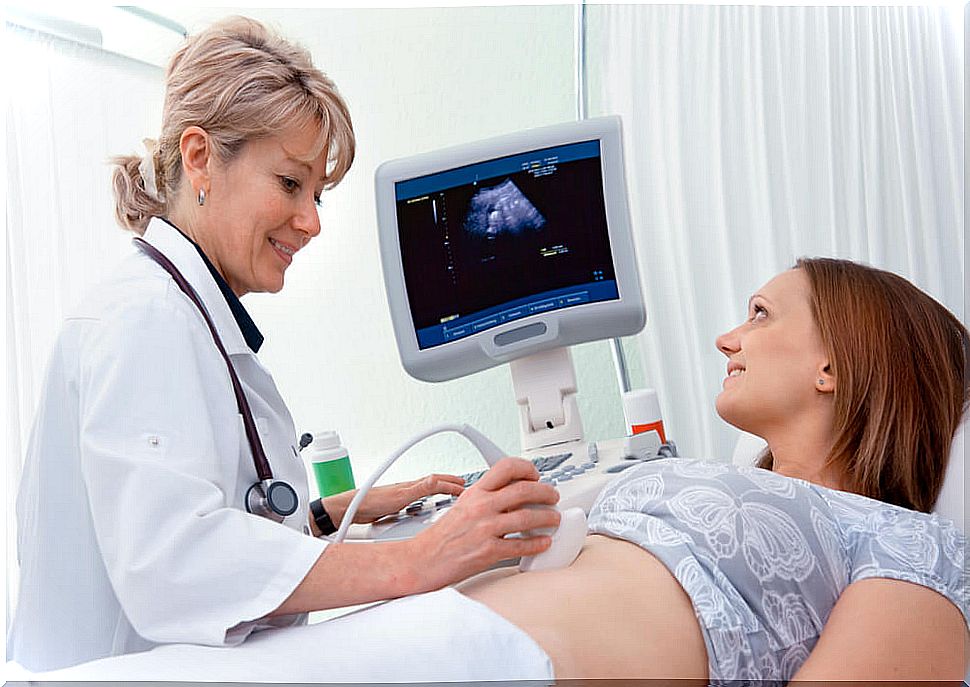Baby’s Heartbeat: When Does It Start To Be Heard?

A baby’s heart begins beating around 21 days of gestation. However, his parents will not be able to hear him until the sixth week of gestation , through the ultrasound study. We go over everything there is to know about this wonderful sound: the baby’s heartbeat.
This examination is necessarily carried out after the sixth week and, sometimes, in the seventh or eighth. In this phase, the baby’s heartbeat begins to be heard at more than 100 beats per minute.
Pregnant women often experience this type of study with great excitement and excitement; Even after this exam, your bond with the baby becomes closer.
However, the importance of conducting the study does not lie only in its affective impact: MRI and other current tests confirm the state of health of the embryo and can generate knowledge about any complication as a result.
According to specialists, it is vitally important that pregnant women perform the Doppler examination regularly. This makes it possible to determine the proper functioning of the cardiovascular system during the baby’s development, in addition to strengthening the bond between mother and baby.
How many beats per minute can a baby have?
It is common for mothers to describe the sound of their baby’s heart as a troop of galloping horses on their first ultrasound examination . This can cause concern in them.
Likewise, it is also normal for the embryo’s pulsations to progressively increase until reaching 170 beats per minute in the second month, with a constant heart fluctuation until the moment of its birth.

A study published in 2010 in the journal Sports Medicine revealed that maternal exercise during the last trimester of pregnancy has an influence on the cardiocirculatory behavior of the maternal-fetal unit. This causes a mechanism of protection and regulation of the health of both until the moment of birth.
Many women are frightened when their baby slows down, but this is common during contractions.
Professionals explain that during a contraction, blood flow to the placenta is reduced and, consequently, the child’s heartbeat drops. The pulsations will return to their normal rhythm when the contraction ends, which can be verified with the use of the Doppler .
The use of equipment such as the portable fetal doppler
For some years now, the handheld electronic doppler has been gaining market positions for pregnant women. Among other things, because it allows you to relive certain experiences of the medical consultation at home.
Although this type of device has not achieved acceptance in the professional world, its use is increasingly frequent by future parents. It is important, however, to have the right information.
There are different and varied professional positions regarding its use and recommendation. Some of the advantages that are often mentioned are:
- It has headphone inputs.
- Those with loudspeakers guarantee simultaneous listening to several family members.
- Can connect to smartphone ; After downloading its application, it is possible to record the baby’s heartbeat on the cell phone and see the sound graph on the phone screen.
- That both parents and anyone who wants it can listen to the baby’s heartbeat as many times as they want and when and where they want it.
Use and Maintenance of the Portable Fetal Doppler
Its use is similar to the ultrasound study carried out in a medical consultation. Like this one, it also requires the application of a gel for its proper functioning. The use of these types of products is important, otherwise the appliance will be damaged.
One of the disadvantages that many of the users manifest is the difficulty of its use. At the same time, they warn about possible errors in their reading and the consequent concern that this generates in future parents about the baby’s heartbeat.

The fetal doppler converts any interior movement it detects into sound. Therefore, the flow of our body regulation, when detected by the device, can become information and induce a false belief about the speed of the baby’s heartbeat.
Therefore, it is recommended to be cautious with these types of products. In the case of people who are anxious or who tend to worry too much, it is best to leave these studies in the hands of the professionals and comply with the visits and the scheduled controls.










